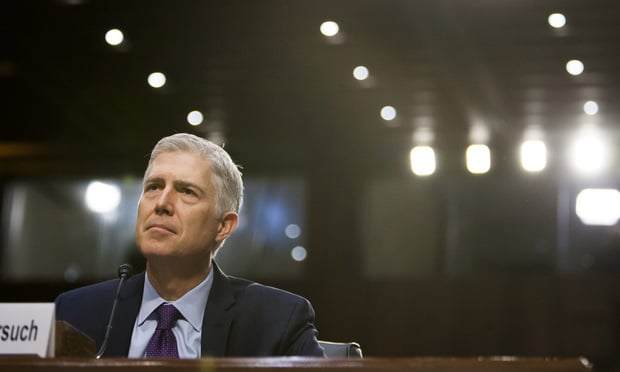As Judges Check Trump, Gorsuch and Thomas Decry 'Chaos' of National Injunctions
"What in this gamesmanship and chaos can we be proud of?" Justice Neil Gorsuch, joined by Justice Clarence Thomas, asked. Last year in an unrelated case, a Washington federal trial judge said the Trump DOJ's crusade against national injunctions "reeks of bad faith" and "demonstrates contempt for the authority that the Constitution's Framers have vested in the judicial branch."
January 27, 2020 at 03:24 PM
5 minute read
The original version of this story was published on National Law Journal
 Neil Gorsuch testifies before the Senate Judiciary Committee in 2017. Photo: Diego M. Radzinschi / NLJ
Neil Gorsuch testifies before the Senate Judiciary Committee in 2017. Photo: Diego M. Radzinschi / NLJ
Justice Neil Gorsuch, joined by Justice Clarence Thomas, on Monday sharply criticized the use of nationwide injunctions and urged the U.S. Supreme Court "at the appropriate juncture" to review what they contend are constitutional questions raised by their use.
"This is not normal," Gorsuch said, after describing how federal trial judges around the country were approving or declining to grant injunctions in challenges to a new Trump administration immigration rule that would redefine criteria for who can be deemed to be dependent on federal benefits.
"What in this gamesmanship and chaos can we be proud of?" Gorsuch asked.
The divided Supreme Court—with Justices Ruth Bader Ginsburg, Stephen Breyer, Sonia Sotomayor and Elena Kagan in dissent—on Monday allowed the Trump administration to challenge a New York trial judge's order, while letting the new regulation temporarily take effect. The case is U.S. Department of Homeland Security v. New York.
The debate over the use of nationwide injunctions has been ongoing for more than two years, fueled in large part by trial and appellate judges blocking controversial new Trump administration policies. Former U.S. Attorney General Jeff Sessions and his successor, William Barr, have inveighed publicly against them several times.
It was Thomas who first raised doubts in the Supreme Court about the constitutional and equitable underpinnings of injunctions that thwart the national implementation of a policy. In a concurring opinion in the travel ban case, Trump v. Hawaii, Thomas questioned whether district judges have the authority to issue nationwide injunctions.
"These injunctions did not emerge until a century and a half after the founding," Thomas asserted. "And they appear to be inconsistent with longstanding limits on equitable relief and the power of Article III courts. If their popularity continues, this court must address their legality."
U.S. solicitor general Noel Francisco had asked the justices in the travel ban case to examine nationwide injunctions, but the high court did not take up the issue. Thomas was alone in the high court in his concurrence and in voicing his skepticism until the Gorsuch concurrence.
Gorsuch used Monday's order in the "public charge" immigration case to convey his views on nationwide injunctions.
"As the brief and furious history of the regulation before us illustrates, the routine issuance of universal injunctions is patently unworkable, sowing chaos for litigants, the government, courts, and all those affected by these conflicting decisions," Gorsuch wrote. "Rather than spending their time methodically developing arguments and evidence in cases limited to the parties at hand, both sides have been forced to rush from one preliminary injunction hearing to another, leaping from one emergency stay application to the next, each with potentially nationwide stakes, and all based on expedited briefing and little opportunity for the adversarial testing of evidence."
Defenders of nationwide injunctions contend they are in some cases "the only means to provide plaintiffs with complete relief, or to prevent harm to thousands of individuals similarly situated to the plaintiffs who cannot quickly bring their own cases before the courts," as Amanda Frost of American University Washington College of Law wrote in a 2018 article. She added: "Sometimes anything short of a nationwide injunction would be impossible to administer."
 U.S. District Judge Ketanji Brown Jackson in D.C. Photo: Diego M. Radzinschi/ NLJ
U.S. District Judge Ketanji Brown Jackson in D.C. Photo: Diego M. Radzinschi/ NLJLast September, a Washington federal trial judge said the Trump Justice Department's move to restrict nationwide injunctions "reeks of bad faith."
"It reeks of bad faith, demonstrates contempt for the authority that the Constitution's Framers have vested in the judicial branch, and, ultimately, deprives successful plaintiffs of the full measure of the remedy to which they are entitled," U.S. District Judge Ketanji Brown Jackson of the District of Columbia said in a ruling.
A recent law review article from Mila Sohoni, a former Jenner & Block associate who clerked for Judge Judith Rogers on the U.S. Court of Appeals for the D.C. Circuit, pushed back at critics of nationwide injunctions who contend they do not have a long history in the law.
"Injunctions that shielded nonparties formed at least a part of the output of the federal courts as far back as 1913, and that even before then—in the 1890s—the [Supreme] Court understood a lower federal court 'sitting in equity' as empowered to offer a 'comprehensive decree covering the whole ground of controversy' that would 'determine once for all' the legality of a state law for 'the entire community,'" Sohoni wrote.
Read more:
Circuits Split and Judges Squabble as Courts Confront National Injunctions
'Reeks of Bad Faith': DC Judge Scolds Trump DOJ's Drive to Restrict Injunctions
Clarence Thomas, Alone, Asserts National Injunctions Are 'Historically Dubious'
DOJ Policy Head Scolds 'Dogged Determination' to Enjoin Trump Administration
U.S. Appeals Judge: Don't End Nationwide Injunctions. (But Here's a Plan for Them.)
This content has been archived. It is available through our partners, LexisNexis® and Bloomberg Law.
To view this content, please continue to their sites.
Not a Lexis Subscriber?
Subscribe Now
Not a Bloomberg Law Subscriber?
Subscribe Now
NOT FOR REPRINT
© 2025 ALM Global, LLC, All Rights Reserved. Request academic re-use from www.copyright.com. All other uses, submit a request to [email protected]. For more information visit Asset & Logo Licensing.
You Might Like
View All
MoFo Associate Sees a Familiar Face During Her First Appellate Argument: Justice Breyer

Amid the Tragedy of the L.A. Fires, a Lesson on the Value of Good Neighbors

Litigators of the Week: Shortly After Name Partner Kathleen Sullivan’s Retirement, Quinn Emanuel Scores Appellate Win for Vimeo
Trending Stories
Who Got The Work
J. Brugh Lower of Gibbons has entered an appearance for industrial equipment supplier Devco Corporation in a pending trademark infringement lawsuit. The suit, accusing the defendant of selling knock-off Graco products, was filed Dec. 18 in New Jersey District Court by Rivkin Radler on behalf of Graco Inc. and Graco Minnesota. The case, assigned to U.S. District Judge Zahid N. Quraishi, is 3:24-cv-11294, Graco Inc. et al v. Devco Corporation.
Who Got The Work
Rebecca Maller-Stein and Kent A. Yalowitz of Arnold & Porter Kaye Scholer have entered their appearances for Hanaco Venture Capital and its executives, Lior Prosor and David Frankel, in a pending securities lawsuit. The action, filed on Dec. 24 in New York Southern District Court by Zell, Aron & Co. on behalf of Goldeneye Advisors, accuses the defendants of negligently and fraudulently managing the plaintiff's $1 million investment. The case, assigned to U.S. District Judge Vernon S. Broderick, is 1:24-cv-09918, Goldeneye Advisors, LLC v. Hanaco Venture Capital, Ltd. et al.
Who Got The Work
Attorneys from A&O Shearman has stepped in as defense counsel for Toronto-Dominion Bank and other defendants in a pending securities class action. The suit, filed Dec. 11 in New York Southern District Court by Bleichmar Fonti & Auld, accuses the defendants of concealing the bank's 'pervasive' deficiencies in regards to its compliance with the Bank Secrecy Act and the quality of its anti-money laundering controls. The case, assigned to U.S. District Judge Arun Subramanian, is 1:24-cv-09445, Gonzalez v. The Toronto-Dominion Bank et al.
Who Got The Work
Crown Castle International, a Pennsylvania company providing shared communications infrastructure, has turned to Luke D. Wolf of Gordon Rees Scully Mansukhani to fend off a pending breach-of-contract lawsuit. The court action, filed Nov. 25 in Michigan Eastern District Court by Hooper Hathaway PC on behalf of The Town Residences LLC, accuses Crown Castle of failing to transfer approximately $30,000 in utility payments from T-Mobile in breach of a roof-top lease and assignment agreement. The case, assigned to U.S. District Judge Susan K. Declercq, is 2:24-cv-13131, The Town Residences LLC v. T-Mobile US, Inc. et al.
Who Got The Work
Wilfred P. Coronato and Daniel M. Schwartz of McCarter & English have stepped in as defense counsel to Electrolux Home Products Inc. in a pending product liability lawsuit. The court action, filed Nov. 26 in New York Eastern District Court by Poulos Lopiccolo PC and Nagel Rice LLP on behalf of David Stern, alleges that the defendant's refrigerators’ drawers and shelving repeatedly break and fall apart within months after purchase. The case, assigned to U.S. District Judge Joan M. Azrack, is 2:24-cv-08204, Stern v. Electrolux Home Products, Inc.
Featured Firms
Law Offices of Gary Martin Hays & Associates, P.C.
(470) 294-1674
Law Offices of Mark E. Salomone
(857) 444-6468
Smith & Hassler
(713) 739-1250







